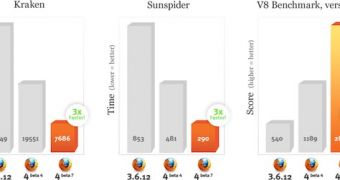Mozilla has a lot on its plate with Firefox 4.0. The browser is a significant improvement over previous versions in pretty much every aspect. One area that has seen a lot of focus, especially with the release of Firefox 4.0 Beta 7, is basic speed, be it JavaScript performance or hardware acceleration of 2D and 3D content.
The big news in Firefox 4.0 Beta 7 is the JägerMonkey JIT (just in time) compiler which works in parallel with the existing TraceMonkey JIT.
JägerMonkey brings a significant speed boost and the latest beta is now several times faster than Firefox 3.6 or previous betas and on par with its competitors like Google Chrome, Safari and Opera.
"The Firefox SpiderMonkey JavaScript engine now incorporates the new JägerMonkey JIT compiler, which, along with enhancements to the existing TraceMonkey JIT and SpiderMonkey’s interpreter, add up to speeds that really show off today’s rich Web apps. You’ll notice this in faster start-up time, improved page-load speed and the performance of Web apps and games," Mozilla explained.
Work on JägerMonkey started early this year and the team has made tremendous strides since.
Firefox 4.0 Beta 7 is three times faster than the latest Firefox 3.6.12 in Mozilla's own JavaScript performance benchmark Kraken, three times faster in Apple's popular Sunspider benchmark and five times faster in Google's V8 benchmarking suite.
Mozilla's tests don't compare the latest beta with competing browsers, for obvious reasons, but Firefox 4.0 should be able to hold its own against even the fastest browser out there.
Firefox has been falling behind in JavaScript performance, with Google Chrome, Apple Safari and Opera engaging in an arms race in the last couple of years. And the upcoming IE9 promises huge improvements as well.
JavaScript performance is becoming increasingly important as the web turns from content source to application platform. One of the main reasons Google got into the browser game was to push forward JavaScript performance, something it has clearly managed to do.

 14 DAY TRIAL //
14 DAY TRIAL //